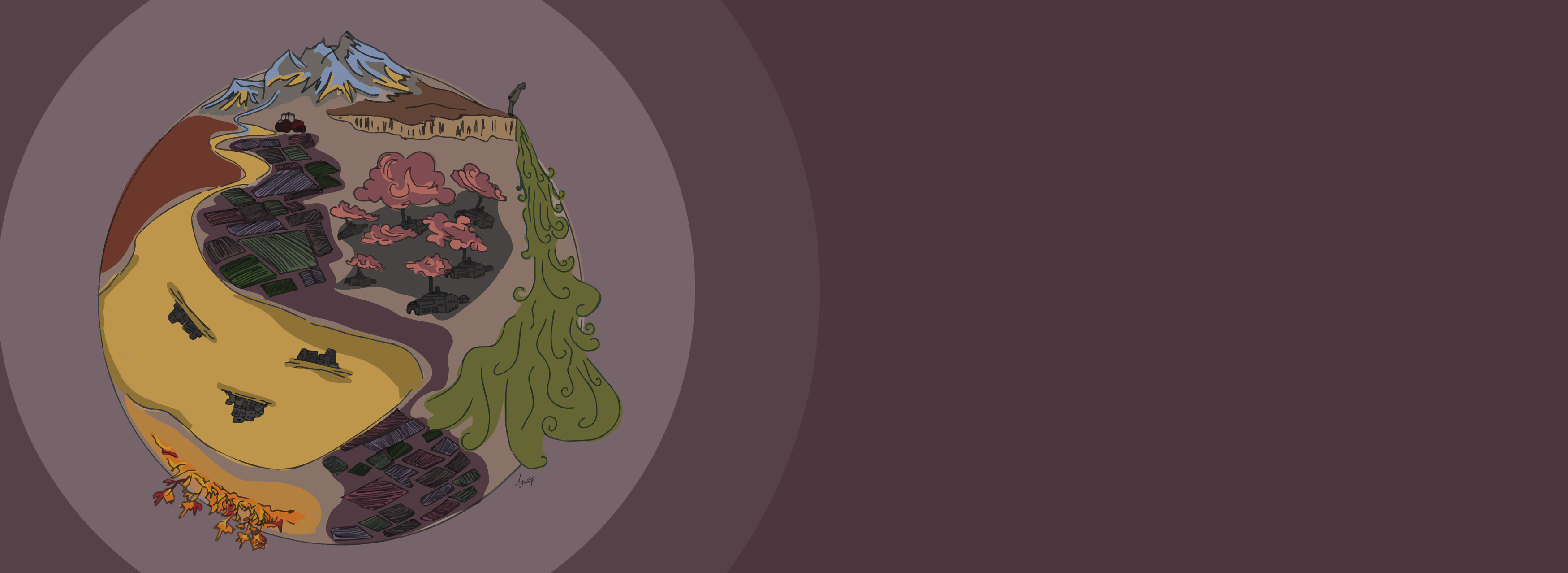Beyond the Safe Space: LUGO Podcast Miniseries
These podcast episodes were written for the Green Office’s Spring Podcast competition and miniseries 'Beyond the Safe Space', on the theme: the Planetary Boundaries, which took place between the months of March-May 2023.
Over nine episodes, the series explores the planetary boundaries that make up the safe operating space for humanity (now decidedly unsafe, having crossed 6/9 boundaries as of April 2022). Available on Spotify.

This podcast series was created to give students and staff at Leiden University a platform to creatively explore science communication, as well as raise awareness about each boundary. The guiding question across episodes remains: what could life look like beyond our safe space, and what do we stand to lose?
*
1st Place. Envisioning Change: Subjugation to Transformation (Land System Change).
By Laoise Brennan.
Laoise Brennan shares her thoughts on her own connection to Mother Nature and the power of visualisation and imagination, in relation to land system change. The format is narrative spoken-word, and the result is equal parts knowledge and emotional appeal. Listen to the episode: here. Full references in episode description.
Honourable Mention. Houston, we have a problem (Climate Change).
By Charlotte Salmon and Juanita Sierra Gomez.
Charlotte Salmon and Juanita Sierra Gomez discuss Spaceship Earth and the Apollo 13 mission as analogies that capture the essence of the planetary boundaries framework, and especially climate change. How do the challenges faced by the Apollo 13 crew mirror the complex challenges that the planet is facing today? This spoken essay explores the value of monitoring for maintaining a healthy planet for generations to come. Listen to the episode: here. Full references in episode description.
Honourable Mention. The Bias of Safety (Biosphere Integrity).
By Marco Segantini and Emma Buijse.
Marco Segantini and Emma Buijse hold a conversation on the biases surrounding the definition of a safe space and what we value in nature, at the interface of science and philosophy. What we value affects what we know, and what we know determines what we find acceptable to lose. So, what makes the cut? Listen to the episode: here. Full references in episode description.
Got lost again (Ocean Acidification).
Written by Laura Steel Pascual, voiced by Henry Boeree.
This episode takes the form of a short story from the personified perspective of a clown fish, recently diagnosed with acidosis, a condition emerging in fish as a consequence of the ocean’s changed chemistry. Voiced by Henry Boeree, written by Laura Steel Pascual. Listen to the episode: here. Full references in episode description.
Ode to Ozone (Stratospheric Ozone Depletion).
By Gergana Racheva.
Ode to Ozone is a playful poem by Gergana Racheva. The verses address our Ozone directly, intellectually and emotionally, spoken in praise and action conducive. Listen to the episode: here. Full references in episode description.
Sensing Air (Atmospheric Aerosol Loading).
By Inaya Basu.
Inaya Basu discusses air quality, air particles, and air perception, exploring the interlinkages between visibility, acknowledgement and action. How bad is really bad? Can we quantify what is invisible? Are we headed towards a 'slow-death'? Listen to the episode: here. Full references in episode description.
Has silence sprung? (Novel Entities)
By Natalie Cru.
Earth’s music, or the soundscapes made of animal and environmental sounds is an indicator of ecosystem health. As biodiversity is threatened by novel entities and other transgressions of our planetary boundaries, species lose their safe space to sing, or in other words, natural areas lose their sounds. Softly, Natalie Cru showcases how silence threatens our wilderness, and what we stand to lose if we keep our novel entities unchecked. Listen to the episode: here. Full references in episode description.
Green Gold (Freshwater Use).
By Laura Steel Pascual and Anjeza Llulla.
Laura Steel Pascual and Anjeza Llulla help us understand how including 'green water' in new boundary assessments has led scientists to declare freshwater use as the most recently crossed planetary boundary (April 2022). Are you falling if you don’t know you’re falling? Absolutely. Listen to the episode: here. Full references in episode description.
The Nitrogen Crisis Explained (Biogeochemical Flows).
Written by Natalie Cru, voiced by James van Veen.
In under six minutes, the basics of the Dutch Nitrogen Crisis are explained, in relation to its effect on the Earth system's biogeochemical flows. Why is excess nitrogen deposition a problem? What even is nitrogen deposition in the first place? Voiced by James van Veen. Listen to the episode: here. Full references in episode description.

